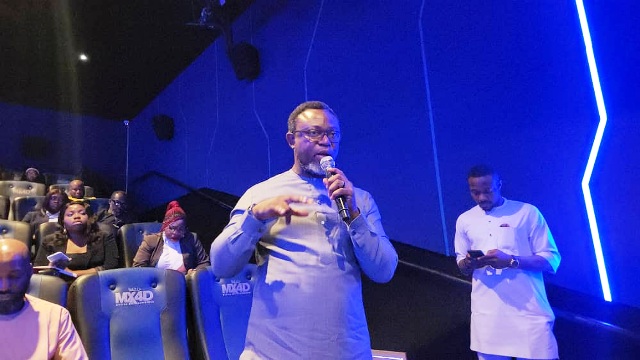Admin l Friday, March 10, 2023
LAGOS, Nigeria – The Nigerian creative industry has captured the attention of industry stakeholders who have come together to discuss the proposed Creative Industries Development Bill (CIDB) and its potential to transform the Nigerian creative economy.
This collaborative effort between Nigeria’s creative industries and the Presidency seeks to enhance the industry through a well-designed action plan centered on putting the creatives “FIRST”: Funding, Incentives, Research, Skills, and Training.
The stakeholder engagement series led by the CIDB team kicked off on 4 March 2023, with an engagement session at the Omenka Gallery in Lagos, hosted by Oliver Enwonwu. The event was attended by prominent stakeholders in the visual arts and arts sector, including leading gallery owners and curators such as the Executive & Artistic Director of the Centre for Contemporary Art, Lagos (CCA, Lagos) Oyindamola Layo Fakeye, and Segun Oni of The Children’s Art Gallery (TCA). Two key takeaways from that engagement were the concepts of Perpetual Royalties for artists on their work and the insertion that all new public buildings in Nigeria (Federal State and Local) should have iconic arts embedded in their budgets leading to a legacy of public monuments across Nigeria and the growth of the art market.
The following day, on Sunday, 5 March, the CIDB team met with leaders from the creative writing, performing arts, and theater sectors. These included Ifeanyi Avajah, chairman of the Lagos branch of the Association of Nigerian Authors (ANA), Israel Eboh, president of the National Association of Nigerian Theatre Arts Practitioners (NANTAP), as well as cultural advocate Jahman Anikulapo, chair of the Committee for Relevant Art (CORA) and the filmmaker, Mahmoud Ali-Balogun. Anwuli Ojogwu, of the Society of Books and Magazines Editors of Nigeria (SBMEN), enjoined the CIDB team to consider that not all art, especially creative writing, worked on the for-profit model. She hoped that grants for creatives were one of the items being considered in the bill.
The team also met with media and culture entrepreneurs, that included conversations with the founder of the Silverbird Group, Ben Murray Bruce; the CEO of EbonyLife Media, Mo Abudu; the theatre producer, cultural entrepreneur and the CEO of Terra Kulture, Bolanle Austen-Peters; founder and the CEO of Africa International Film Festival (AFRIFF), Chioma Ude; the COO of Mavin Records, Tega Oghenejobo; Prolific comedians, Bovi, Nedu, and Chukwudi ‘Husband Material’ Ezugwu; creative industries leader and Comedian/Entrepreneur, Ali Baba and actor, Eyinna Nwigwe.
Laoye Jayieola, the CEO of the Nigeria Economic Summit Group (NESG) hosted the CIDB team led by the Senior Special Assistant to the President on Country Risk Assessment and Evaluation, Col. Felix Alaita (rtd), Chinenye Mba Uzoukwu, and Obi Asika, at the NESG headquarters, Summit House, on 7 March 2023. The meeting included the National Assembly Business Environment Roundtable (NASSBER) team and thematic leads from relevant NESG sectors. It was aimed at building support and momentum from the organized private sector. Dr Ikenna Nwosu, Facilitator, Tourism, Hospitality, Entertainment, Creatives and Sports Business (THECS) Policy Commission welcomed the idea of the CIDB and agreed that the NESG would collaborate with the team for the success of the project.
At the session hosted by Filmhouse Cinemas and TRACE, for players in the Television, Film, Advertising, Arts, Gaming, and Animation sectors, on 8 March, Col. Felix Alaita (rtd), explained that the CIDB as championed by the Presidency, is specifically aimed at transforming the Nigerian creative space through access to funding, provision of incentives, enabling research, and the creation of an environment for skills development and training.
Kelechi Nwosu of TBWA Concept spoke to the significance of the CIDB for the Advertising sector, while Anwulika Agina of Pan African University spoke on the need for -research institutes and schools to be inclusive. Also in attendance were Charles Novia, Tunde Laoye, Efe Omorogbe, Queen Ebigieson, Emeka Ossai, and Brenda Fashugba, amongst others.
Obi Asika, one of Nigeria’s renowned creative industries’’ leaders and the CIDB Stakeholders Engagement Sub-Committee Lead, stated that the CIDB is a “whole of government and whole of nation” approach with key stakeholders continuously engaged. Chukuka Chukuma, Investment Banker and the CIDB Finance Sub-Committee Lead, emphasized the importance of leaving no one behind and the need to enable and support the sector. He explained that the bill is not intended to replace existing agencies but to act in the best interests of the creative industries, and drive collaboration. He noted that the private sector, development finance institutions, and global multilaterals all seek a clear line of sight into the sector, and the CIDB will meet their expectations and provide a one-stop-shop that facilitates seamless foreign direct investments.
Other members of the CIDB Presidential Advisory team–including Davidson Oturu, Ojoma Ochai, Tonye Faloughi-Ekezie, Baba Agba, Enyi Omeruah, Femi Odugbemi, Ijeoma Onah, Moses Babatope, Titilayo Adebola, Eghosa Imasuen, Oswald Osaretin Guobadia, and Chichi Nwoko–were present to give further insights into the details of the CIDB. Sam Onyemelukwe of TRACE espoused the vision of the CIDB as one whose time has come.
The CIDB team had a highly successful trip to Lagos. The engagement sessions were robust two-way conversations, and the consultation process is constant and ongoing. The general consensus of attendees was gratitude for the efforts of the minister of information and culture in promoting the kind of collaborative environment that led to the development of this laudable bill. Further engagements have been scheduled and planned for the six geopolitical zones. This approach provides an opportunity for Nigeria to be intentional about projecting Nigerian soft power and Nigerian Storytellers.
The continuing stakeholder engagement sessions aim to provide an opportunity for industry professionals to engage with the CIDB team, understand the significance and benefits of the bill, and provide valuable insights to make it fit-for-purpose and shape the future of the creative industries in Nigeria.
